Global Seed Grant Activity Board
[TOA] Young Organic Farmers: Organic Seeds Production Training
1기
작성자
Narumon Paiboonsittikun
작성일
2020-08-16 17:58
조회
557
1. Project description
The project aims to train young organic farmers on organic seeds production (Open Pollination Seeds) and strengthen a young organic farmers network.
Originally, we planned to for a 7-day training at Mae-tha Community in Chiang Mai where a group of young people are working continuously on organic seeds production and organic farming in their community. Due to the COVID-19 pandemic the project has to adapt the training to virtual training- Young Organic Farmers Online Training from 1 August to 14 August 2020.

In June, the team had discussed with young people and young farmers in Mekong Country and Bhutan about the training and the possibility organizing it. We had a very good respond from young people to participate in the training, unfortunately the international travel is not allowed and country procedure regarding the coronavirus is not suitable for the international exchange programme. Therefore, we decided the online training is our option for regional learning and sharing.
In July, there were 2 major activities, the curriculum development and participant selection process.
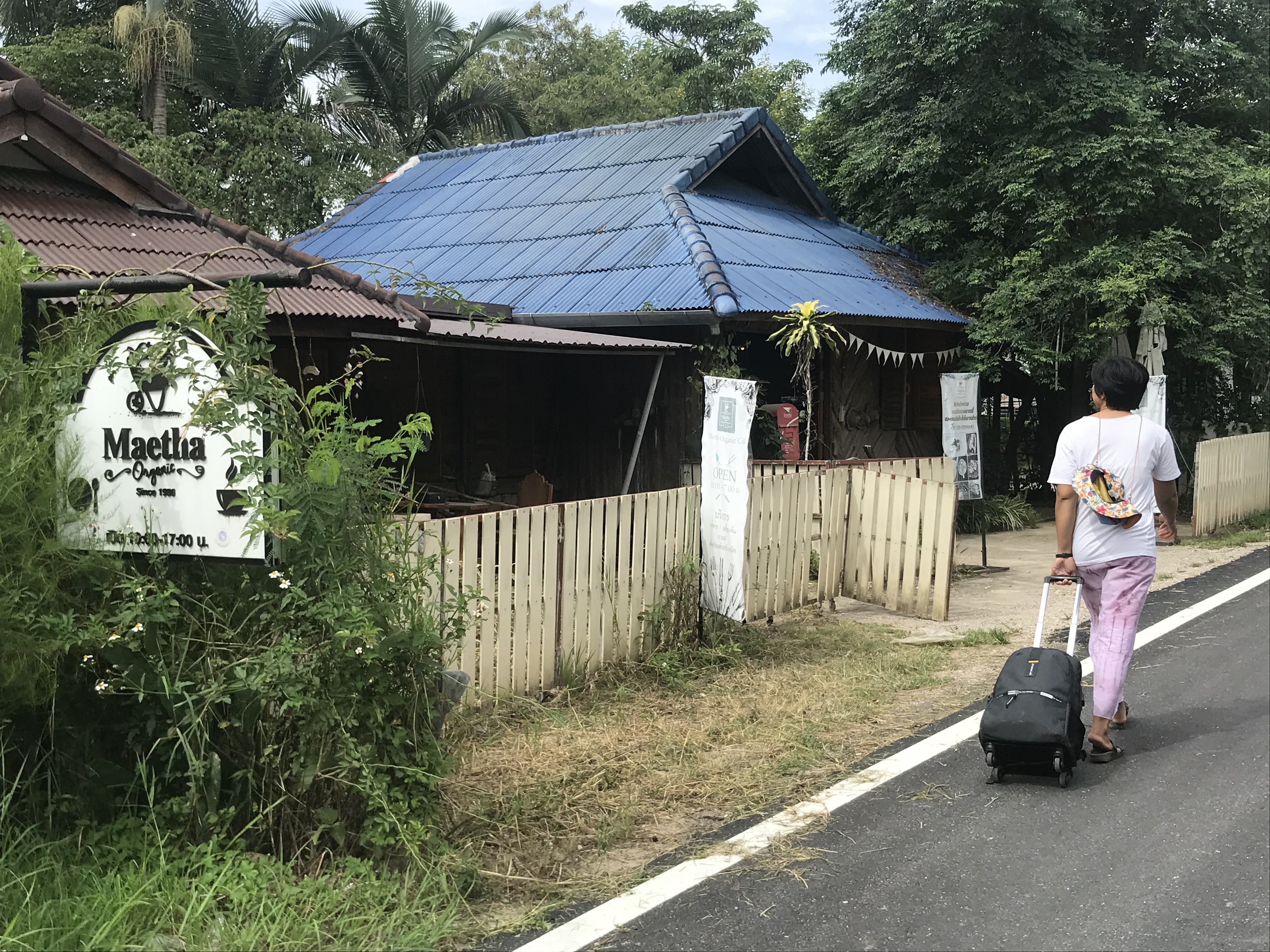
The curriculum of Young Organic Farmers Online Training can be divided in 3 parts. The first part is about the overview of the online training and organic agriculture, we will discuss about the training process, climate change issue, and seeds law & regulation. The second part, the participant will learn about organic seeds production, there are 11 steps of seed production, including techniques and lessons learned from the experiences. And the third part is about the key factors of the success such as the holistic approach, value chain, market, and consumer.
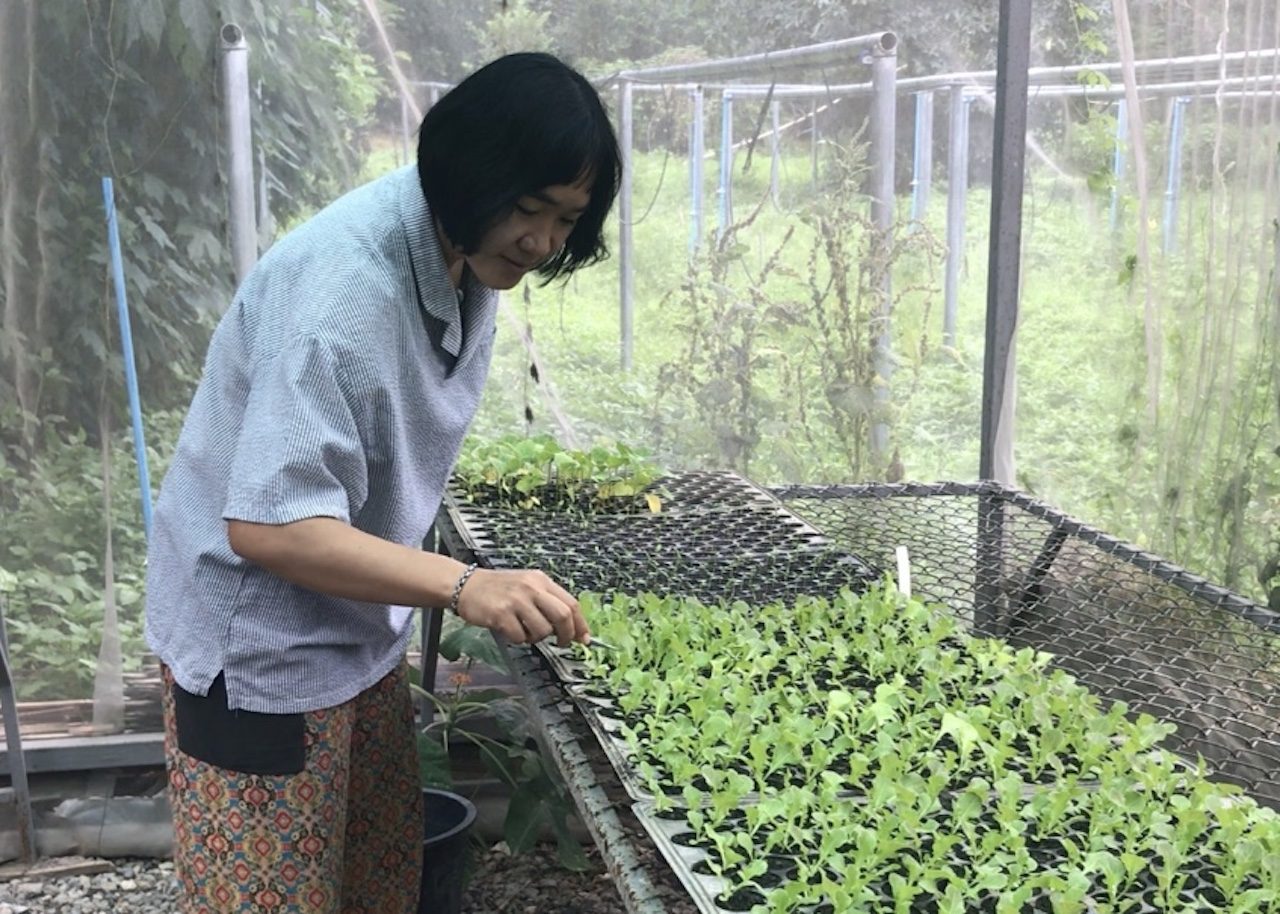 For the selection process, the team had produced the brochure and distrusted the posters and the course information through social medias- website, Facebook, and Instagram.
For the selection process, the team had produced the brochure and distrusted the posters and the course information through social medias- website, Facebook, and Instagram.
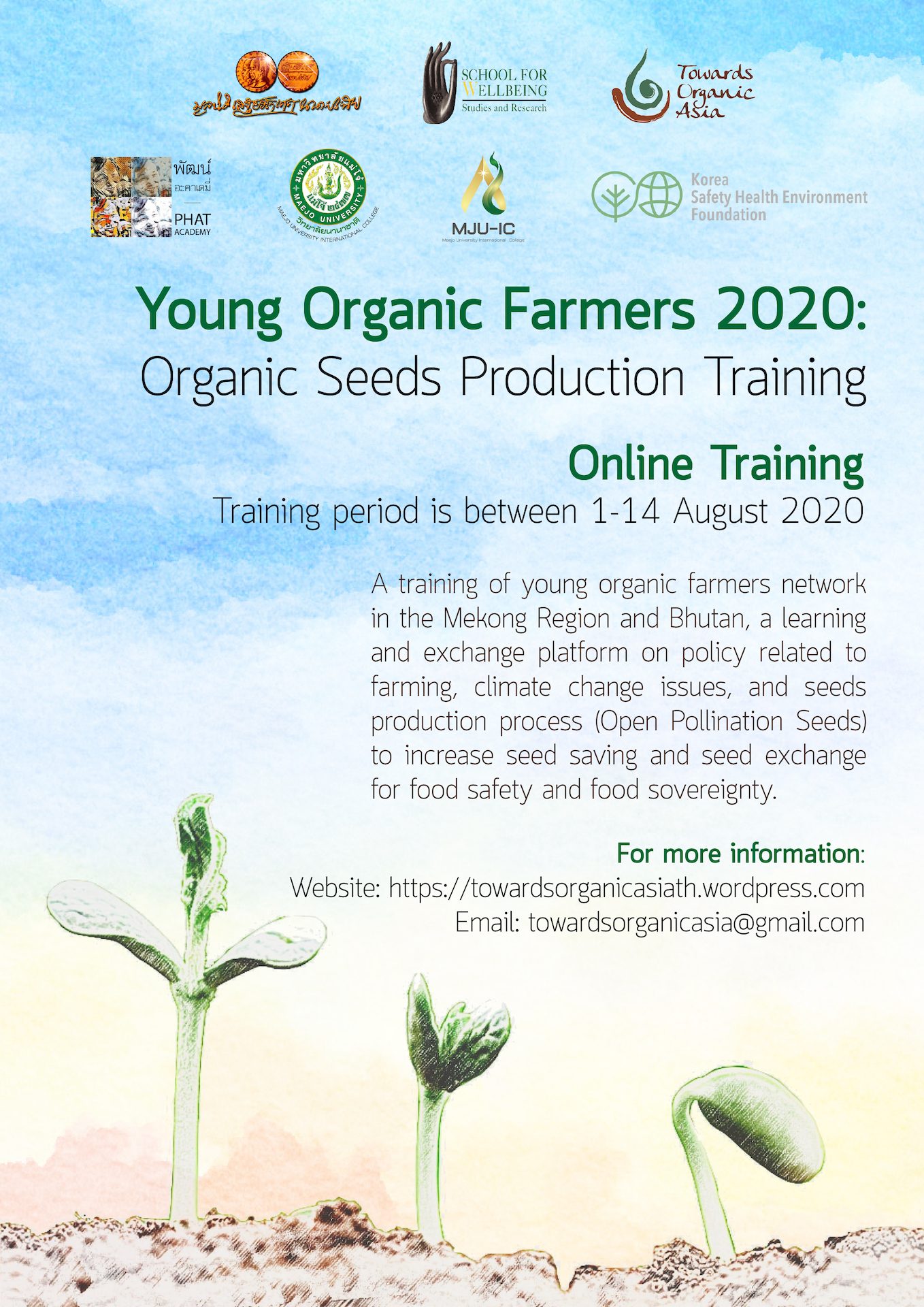
The applicants have to submit an online application form, after that the team will select the participant and ask for their confirmation and the online consent approval.
2. Project progress up to now
By the end of July, there were 170 people applied, and the team had selected 90 participants to participate in the 2-week online training. The participants are from 12 countries- Cambodia, Laos, Myanmar, Thailand, Vietnam, Bhutan, India, Fiji, Malaysia, Nepal, Philippine, and Singapore. They are young people study and work on agriculture as a project staff, government officer, and individual/family farm. We understand that people might have an urgent duty and responsibility coming during the 2-week course, so we accepted 90 participants in case some of them might not be able to participate.
The team had extended the collaboration with Maejo University and invited various resource persons including professor from the university, who have experience on organic agriculture and organic movement, to share and discuss with the participants such as, Vandana Shiva, Right Livelihood Award Laureate 1993. Vandana Shiva is an environmental activist working closely with local communities. She founded Navdanya, a national movement in India, to protect the diversity and integrity of living resources.
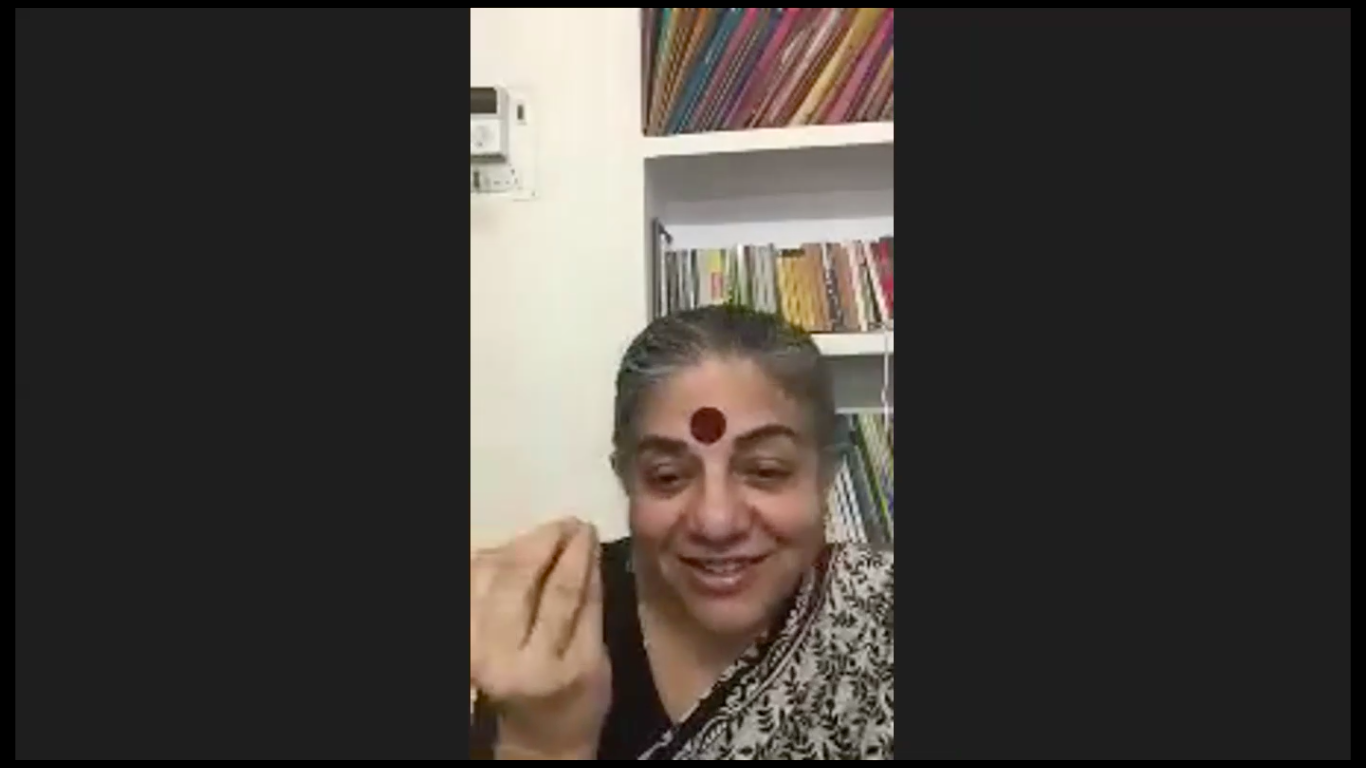
Hans van Willenswaard, Advisor of the School For Wellbeing Studies and Research. Hans co-founded Suan Nguen Mee Ma Social Enterprise with his wife Wallapa. He also founded the School For Wellbeing Studies and Research which includes Towards Organic Asia (TOA) as a major project.
Shui-Meng Ng, Wife of Sombath Somphone. Shui-Meng is a Singaporean who has worked with UNICEF in Laos, China and Timor-Leste. She has also founded ‘Chaoban Crafts’ which is currently known as ‘TaiBaan Crafts’, a social enterprise in Lao working closely with local artisans.
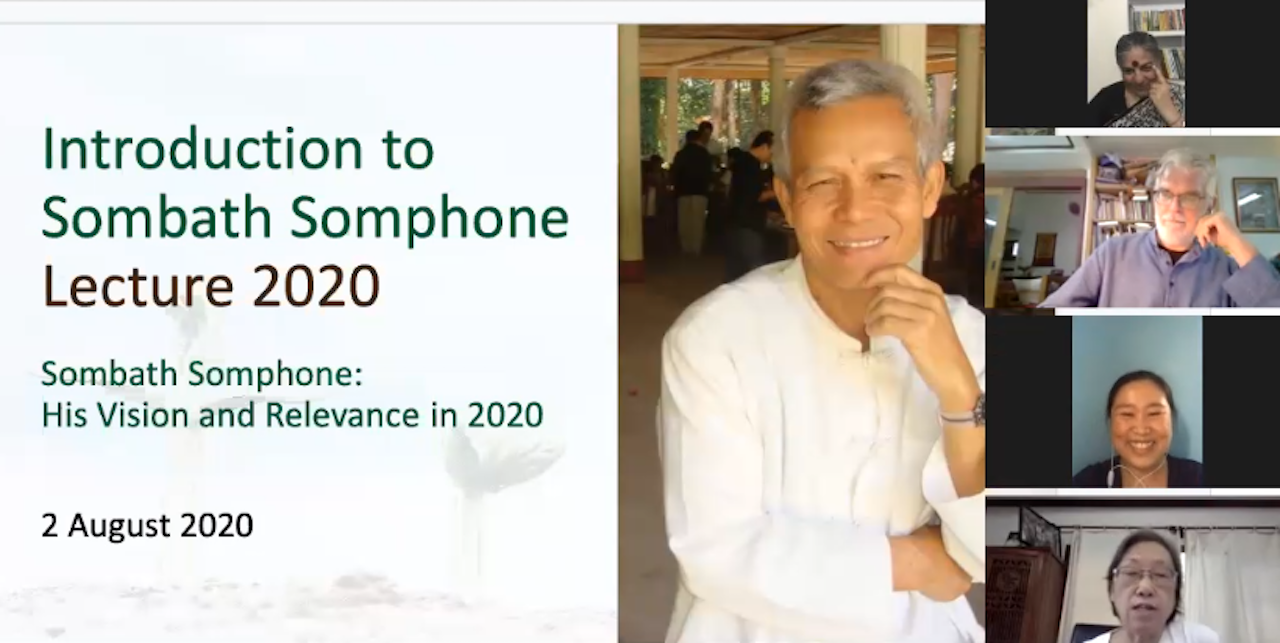
Supa Yai-muang, Director of Sustainable Agriculture Foundation (Thailand). Supa Yai-muang has been working on promoting and supporting research and studies to develop public policy related to sustainable agriculture.
Kingkorn Narintarakul na Ayudhaya, the co-founder of the Food for Change, vice-president of the BioThai Foundation. Kingkorn is working on “food literacy”- the key for change is realizing “the most political act we do on a daily basis is choosing what to eat”.
Vitoon Panyakul, founder of Green Net Cooperative and Earth Net Foundation. Vitoon is a pioneer of organic movement in Thailand, promoting organic and fair trade. He has worked as consultant for many projects of the United Nations.
Dr. Chuanchom Boonrahong is the Deputy Dean of Student Affairs of Business Administration at Mae Jo university. Dr. Chuanchom is an expert at sustainable agriculture including organic agriculture, market systems for organic produce, and the certification of organic products. Moreover, he is also experienced in developing and assisting organic community and driving policy related to community development and agriculture.
Assoc. Prof. Dr. Rapeephun Dangtungee,the dean of Maejo University International College. Dr. Rapeephun holds a Ph.D. in Polymer Science from Chulalongkorn University, Masters and B.Sc. from King Mongkut’s University, Thonburi and Patumwan Institute of Technology, Thailand. He has a great passion for research and has proven himself as a prolific researcher within the academic sector.
During the preparation and training the team had produced different type of material, for online promotion we produced poster in English and Thai, and speaker’s information, and for online training we produced handbook, PowerPoint Presentations, Key Learning, and Certificate for all participants.

The online training was organized from 1-14 August. Every day the team operated the zoom meeting from 13.30 to 16.00 (Bangkok Time), please the attached handbook for more information, from Mae-tha Community in Chiang Mai. Mae-tha is a successful model for organic farming and young people are practicing organic farming. Also, one of the young people is working on organic seeds production more than 7 years. Therefore, working from Mae-tha community will help us access to the practitioners and the work in the community directly. The team will be able to support the young people for a deeper sharing, and strengthen our connect for future collaboration.
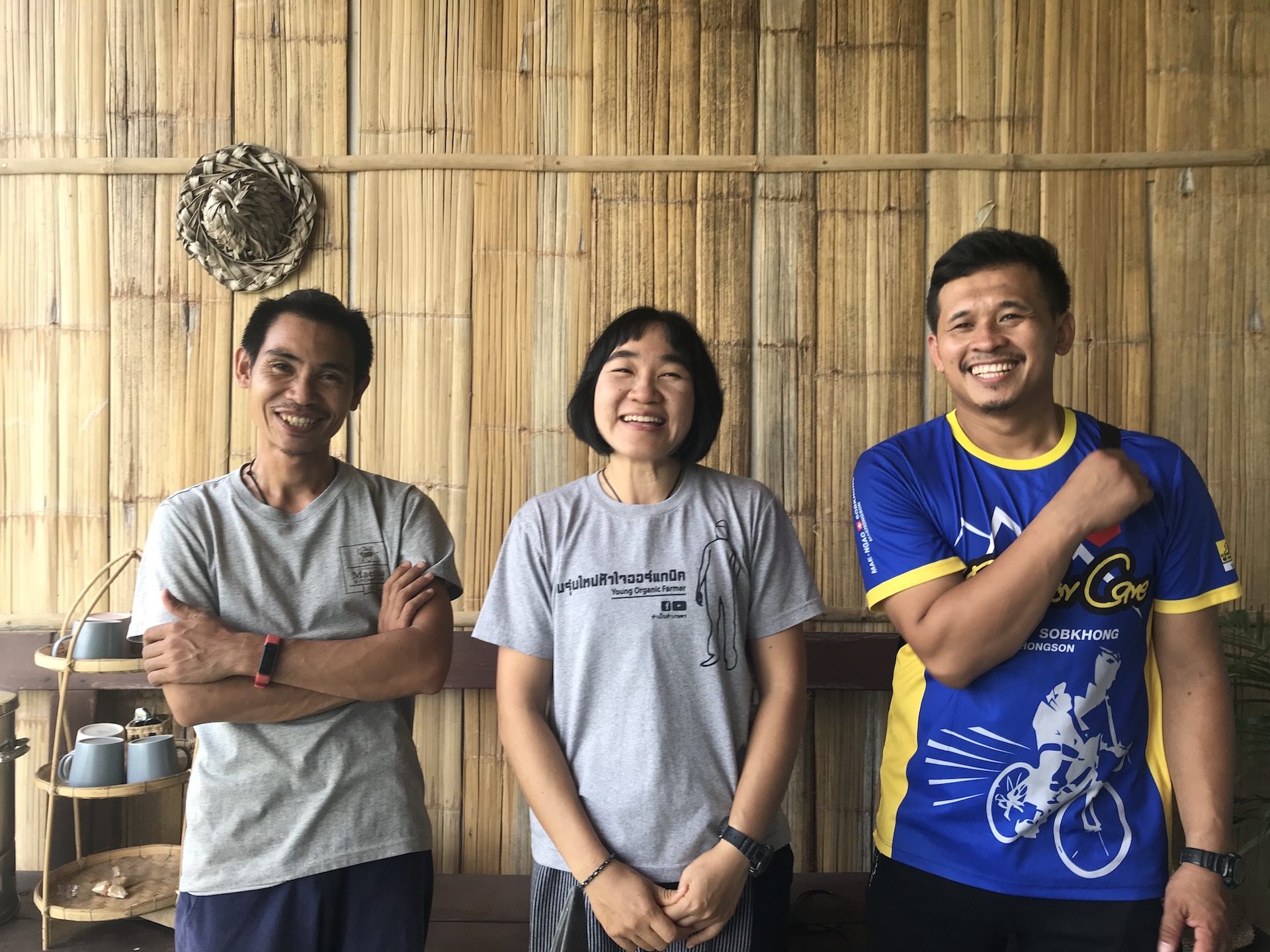
At the beginning and the end of the online training we invited many speakers, as mentioned above, to share and discussion with the group, and the main resource person was Mathana Aphaimool, Organic Seeds Grower, The online training got fully support from young organic farmers in Mae-tha community, and facilitated by TOA team with a technician for zoom and internet access. There were 42- 75 participants participated in the 2-week online training.
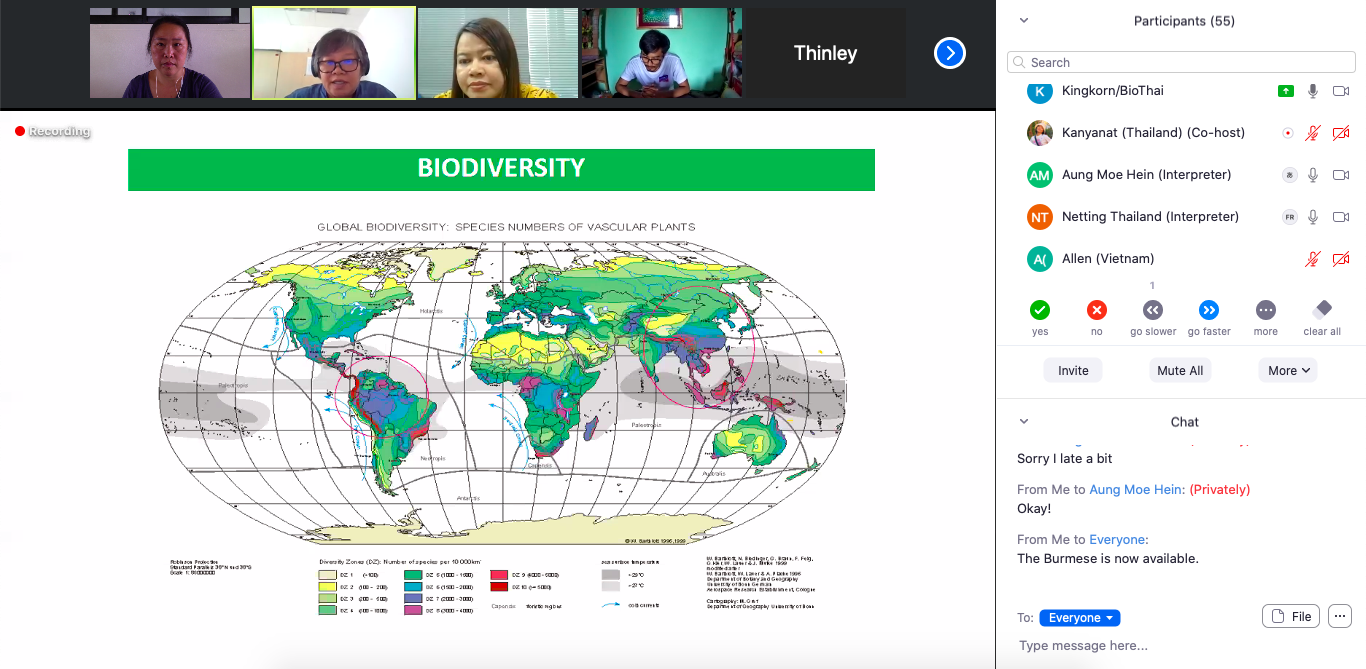
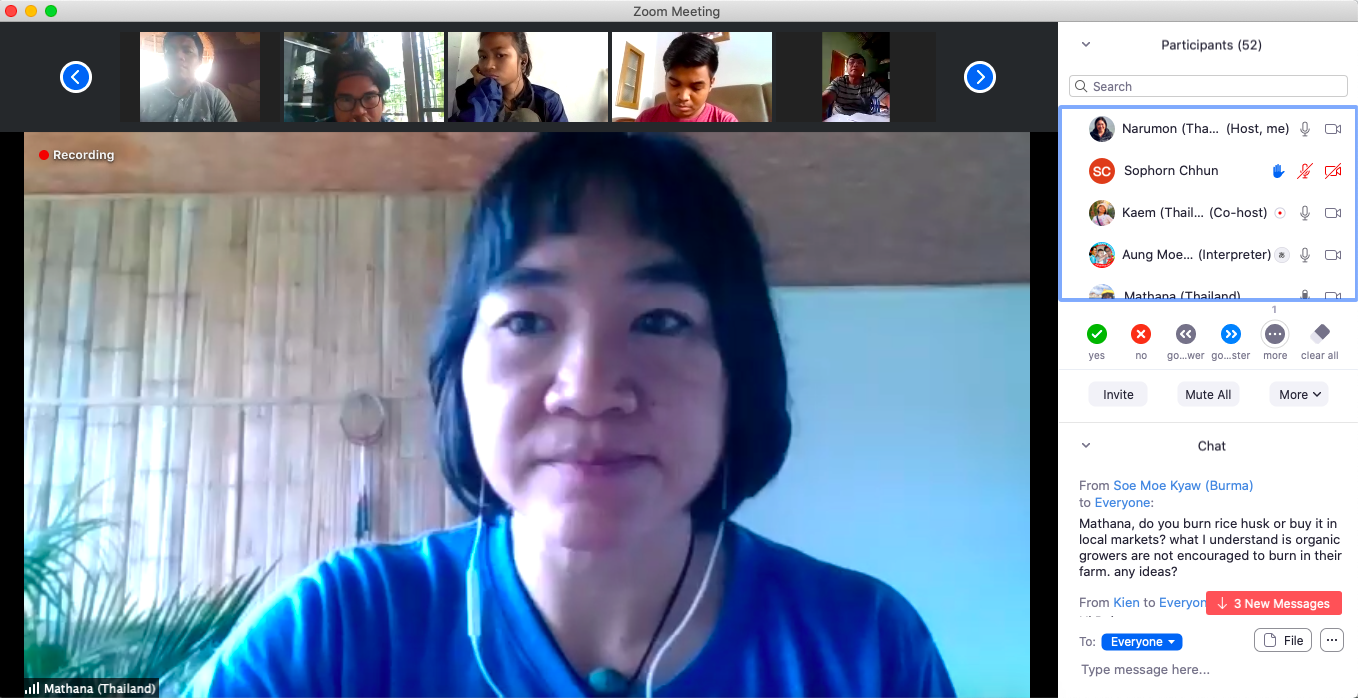
The component of daily schedule was check-in, overview of the daily topic, prestation, questions and answers, short break, and the group sharing. There was a translation available, and the participants from Laos, Myanmar, and Thailand who need support can access to the interpretation system.
After learning together for 12 days on organic agriculture and seeds production, the last 2 days were planning and evaluation. The group discussed about the main idea for personal planning and support. There were 6 areas of interest that the group shared- Expanding organic farming in the community and country, Markets, Seeds saving & exchange, Educational programme & study tour for capacity building and technical exchange, Homestay & Eco-tour, and Networking. Then the group discussed about communication system that would help for future exchange; the conclusion about this is setting up Facebook messenger group and zoom meeting every 1 or 2 months.
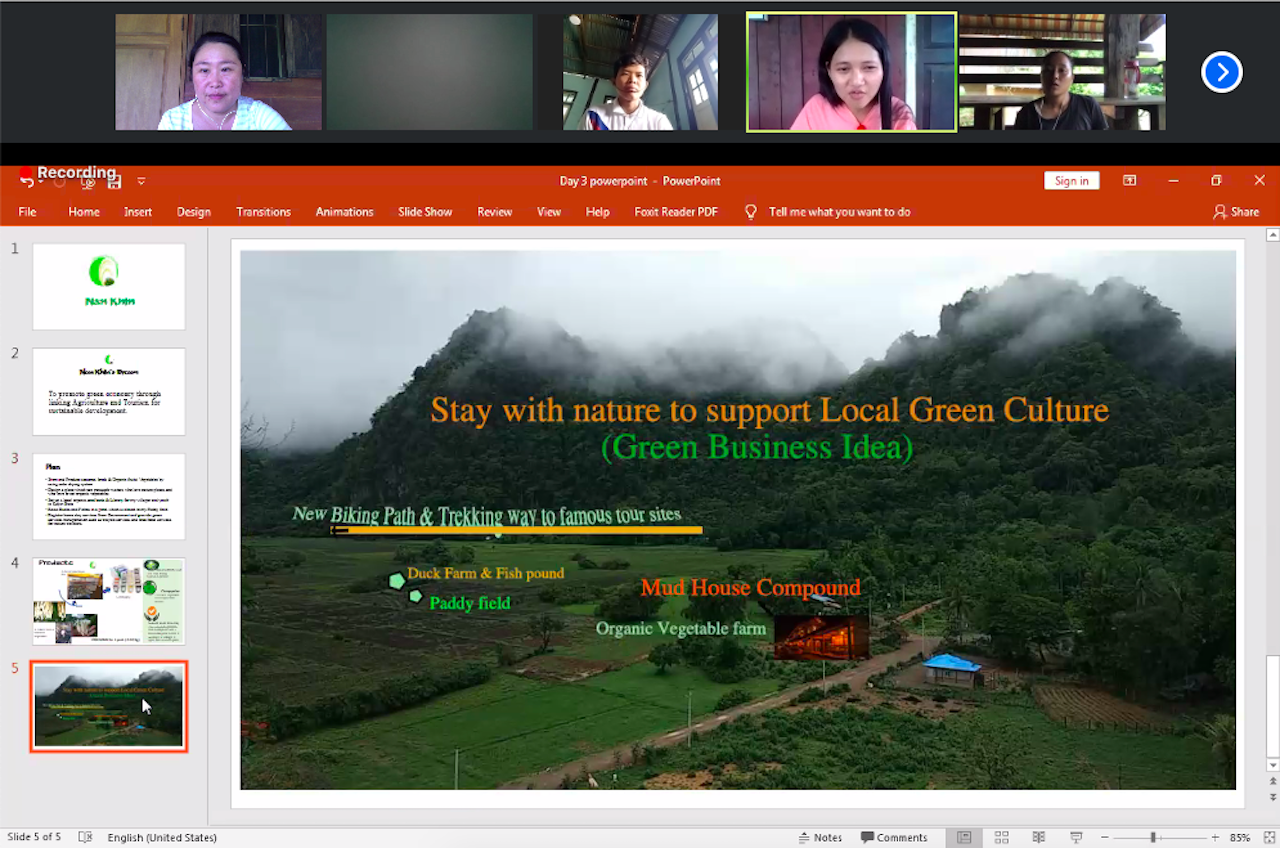
3. Project plan forward
On the last day (14 August), participants filled up the online evaluation form, the team will analyze the feedbacks and suggestions from participants to evaluate the online training on the overall and general evaluation, individual session, learning process, and working team.
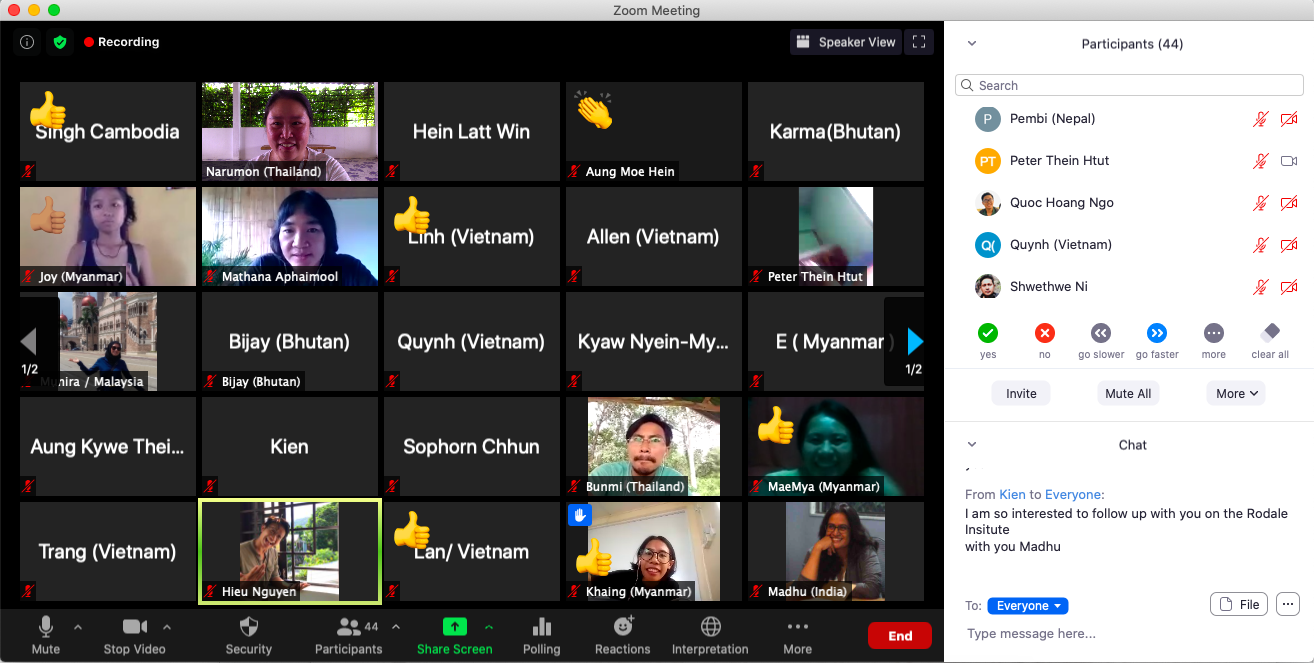
During the training, the team recorded the main session and plan to make short video clip in August -September. The tentative topics for short video are Climate Change, Seeds Laws and Regulation, and Organic Seeds Production.
The output or outcome from the training such as VDO, Participants reflection articles, Key Learning, Lesson Learned will be gathered and distributed on social media if it’s appropriated.
We will set up the Facebook messenger group for sharing and connecting the group, also there is plan to visit Chiang Mai in late September to reflect on the online training and plan for the future collaboration with young organic farmers in the community and Maejo University.
The project aims to train young organic farmers on organic seeds production (Open Pollination Seeds) and strengthen a young organic farmers network.
Originally, we planned to for a 7-day training at Mae-tha Community in Chiang Mai where a group of young people are working continuously on organic seeds production and organic farming in their community. Due to the COVID-19 pandemic the project has to adapt the training to virtual training- Young Organic Farmers Online Training from 1 August to 14 August 2020.

In June, the team had discussed with young people and young farmers in Mekong Country and Bhutan about the training and the possibility organizing it. We had a very good respond from young people to participate in the training, unfortunately the international travel is not allowed and country procedure regarding the coronavirus is not suitable for the international exchange programme. Therefore, we decided the online training is our option for regional learning and sharing.
In July, there were 2 major activities, the curriculum development and participant selection process.

The curriculum of Young Organic Farmers Online Training can be divided in 3 parts. The first part is about the overview of the online training and organic agriculture, we will discuss about the training process, climate change issue, and seeds law & regulation. The second part, the participant will learn about organic seeds production, there are 11 steps of seed production, including techniques and lessons learned from the experiences. And the third part is about the key factors of the success such as the holistic approach, value chain, market, and consumer.
 For the selection process, the team had produced the brochure and distrusted the posters and the course information through social medias- website, Facebook, and Instagram.
For the selection process, the team had produced the brochure and distrusted the posters and the course information through social medias- website, Facebook, and Instagram.
The applicants have to submit an online application form, after that the team will select the participant and ask for their confirmation and the online consent approval.
2. Project progress up to now
By the end of July, there were 170 people applied, and the team had selected 90 participants to participate in the 2-week online training. The participants are from 12 countries- Cambodia, Laos, Myanmar, Thailand, Vietnam, Bhutan, India, Fiji, Malaysia, Nepal, Philippine, and Singapore. They are young people study and work on agriculture as a project staff, government officer, and individual/family farm. We understand that people might have an urgent duty and responsibility coming during the 2-week course, so we accepted 90 participants in case some of them might not be able to participate.
The team had extended the collaboration with Maejo University and invited various resource persons including professor from the university, who have experience on organic agriculture and organic movement, to share and discuss with the participants such as, Vandana Shiva, Right Livelihood Award Laureate 1993. Vandana Shiva is an environmental activist working closely with local communities. She founded Navdanya, a national movement in India, to protect the diversity and integrity of living resources.

Hans van Willenswaard, Advisor of the School For Wellbeing Studies and Research. Hans co-founded Suan Nguen Mee Ma Social Enterprise with his wife Wallapa. He also founded the School For Wellbeing Studies and Research which includes Towards Organic Asia (TOA) as a major project.
Shui-Meng Ng, Wife of Sombath Somphone. Shui-Meng is a Singaporean who has worked with UNICEF in Laos, China and Timor-Leste. She has also founded ‘Chaoban Crafts’ which is currently known as ‘TaiBaan Crafts’, a social enterprise in Lao working closely with local artisans.

Supa Yai-muang, Director of Sustainable Agriculture Foundation (Thailand). Supa Yai-muang has been working on promoting and supporting research and studies to develop public policy related to sustainable agriculture.
Kingkorn Narintarakul na Ayudhaya, the co-founder of the Food for Change, vice-president of the BioThai Foundation. Kingkorn is working on “food literacy”- the key for change is realizing “the most political act we do on a daily basis is choosing what to eat”.
Vitoon Panyakul, founder of Green Net Cooperative and Earth Net Foundation. Vitoon is a pioneer of organic movement in Thailand, promoting organic and fair trade. He has worked as consultant for many projects of the United Nations.
Dr. Chuanchom Boonrahong is the Deputy Dean of Student Affairs of Business Administration at Mae Jo university. Dr. Chuanchom is an expert at sustainable agriculture including organic agriculture, market systems for organic produce, and the certification of organic products. Moreover, he is also experienced in developing and assisting organic community and driving policy related to community development and agriculture.
Assoc. Prof. Dr. Rapeephun Dangtungee,the dean of Maejo University International College. Dr. Rapeephun holds a Ph.D. in Polymer Science from Chulalongkorn University, Masters and B.Sc. from King Mongkut’s University, Thonburi and Patumwan Institute of Technology, Thailand. He has a great passion for research and has proven himself as a prolific researcher within the academic sector.
During the preparation and training the team had produced different type of material, for online promotion we produced poster in English and Thai, and speaker’s information, and for online training we produced handbook, PowerPoint Presentations, Key Learning, and Certificate for all participants.

The online training was organized from 1-14 August. Every day the team operated the zoom meeting from 13.30 to 16.00 (Bangkok Time), please the attached handbook for more information, from Mae-tha Community in Chiang Mai. Mae-tha is a successful model for organic farming and young people are practicing organic farming. Also, one of the young people is working on organic seeds production more than 7 years. Therefore, working from Mae-tha community will help us access to the practitioners and the work in the community directly. The team will be able to support the young people for a deeper sharing, and strengthen our connect for future collaboration.

At the beginning and the end of the online training we invited many speakers, as mentioned above, to share and discussion with the group, and the main resource person was Mathana Aphaimool, Organic Seeds Grower, The online training got fully support from young organic farmers in Mae-tha community, and facilitated by TOA team with a technician for zoom and internet access. There were 42- 75 participants participated in the 2-week online training.


The component of daily schedule was check-in, overview of the daily topic, prestation, questions and answers, short break, and the group sharing. There was a translation available, and the participants from Laos, Myanmar, and Thailand who need support can access to the interpretation system.
After learning together for 12 days on organic agriculture and seeds production, the last 2 days were planning and evaluation. The group discussed about the main idea for personal planning and support. There were 6 areas of interest that the group shared- Expanding organic farming in the community and country, Markets, Seeds saving & exchange, Educational programme & study tour for capacity building and technical exchange, Homestay & Eco-tour, and Networking. Then the group discussed about communication system that would help for future exchange; the conclusion about this is setting up Facebook messenger group and zoom meeting every 1 or 2 months.

3. Project plan forward
On the last day (14 August), participants filled up the online evaluation form, the team will analyze the feedbacks and suggestions from participants to evaluate the online training on the overall and general evaluation, individual session, learning process, and working team.

During the training, the team recorded the main session and plan to make short video clip in August -September. The tentative topics for short video are Climate Change, Seeds Laws and Regulation, and Organic Seeds Production.
The output or outcome from the training such as VDO, Participants reflection articles, Key Learning, Lesson Learned will be gathered and distributed on social media if it’s appropriated.
We will set up the Facebook messenger group for sharing and connecting the group, also there is plan to visit Chiang Mai in late September to reflect on the online training and plan for the future collaboration with young organic farmers in the community and Maejo University.